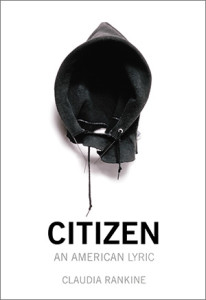 The image of a sweatshirt hoodie on its cover should provide a significant clue as to the stark portrait painted in Citizen: An American Lyric, by Claudia Rankine, but the book’s pages and words are so smooth that you might be lulled into an imagination that the reading will be easy, gentle.
The image of a sweatshirt hoodie on its cover should provide a significant clue as to the stark portrait painted in Citizen: An American Lyric, by Claudia Rankine, but the book’s pages and words are so smooth that you might be lulled into an imagination that the reading will be easy, gentle.
It is not.
Citizen is unequivocally beautiful but not gentle, like the most exquisite love song capturing the precise, bleeding pain of a broken heart. With literary deft and through vignettes of time & space, Claudia Rankine tells the truth of daily Black citizenship in the United States.
“All our fevered history won’t instill insight,
won’t turn a body conscious,
won’t make that look
in the eyes say yes…”
(pg 142, Citizen)
The microaggressions, the daily violences, the very construct of spaces that declare your life to be less than life, and the interior dialogues of one person navigating such experiences: these are the lyrics of Citizen. The book should be required reading for whites who struggle to understand (or think they already know) the racialized landscape of the U.S. and the dynamics of so-called white privilege. Required reading to listen to the pain — just listen, without the rush to white tears or white heroism or white defensiveness — to a story of citizenship that was not meant to be citizenship.
“The worst injury is feeling you don’t belong so much
to you — ”
(pg 146, Citizen)
Citizen: An American Lyric (Graywolf Press 2014) is a necessary and poignant collection of essays, and was named Best Book of the Year by NPR, the New Yorker, the Boston Globe, and many others.

